"Well," said a voice behind him, "find what you were looking for?" The question came from Isabeau. She was leaning against the doorframe of what he now knew was her own room, wearing a towel, which only made Raf more aware of his own nakedness.
"What I was looking for?"
"You were going to find out who Pascal was, remember? Get inside his head and work out who might have really killed him. Since everyone believes Idries, who's convinced it wasn't his cousin. And apparently I'm meant to believe Idries too . . ."
Raf put a hand to his aching head. "I told you I wanted to come here so I could empathize ?"
Isabeau nodded.
"And the other stuff," he looked at her towel, "that just happened?"
"Sure," said Isabeau, turning away. "If you must put it like that." Raf heard her feet on the tiles all the way back to the room they'd shared. There was a slam of the door. Two minutes of muted shuffling, then the noise of the door being opened again. He listened to her shoes slap the tiles, then she was gone with a slam of a different door.
Having dressed, Raf let himself out.
CHAPTER 28
Tuesday 1st March
A neatly bearded man in a tarboosh stared out from a creased page. Below him a caption informed the scruffy girl in black headscarf, jeans and silver trainers that the Emir's eldest son would be dining at the Domus Aurea and, in a return to best Ottoman tradition, his mother had asked that all attendants at the celebratory meal be both deaf and dumb.
Unfortunately, finding staff who fitted this profile while possessing sufficient experience had proved impossible. They had, however, all been carefully screened for suitability.
The rest of the page was equally bland, its headlines subdued and reverential; which was probably why someone had dumped that day's El Pays under a chair in the buffet car.
Putting down the paper, the girl swallowed the last of her coffee and returned her plastic cup to the attendant, even though she had to stand on a cat basket to reach his counter. Then, just to be tidy, she collected up half a dozen other discarded cups and returned those too.
"Thank you." The man at the counter smiled. "Are you this tidy at home?"
Hani nodded, even though it wasn't strictly true. Donna did all of the kitchen cleaning at the madersa and got cross if Hani tried to help. And although Khartoum had explained that Donna was the kind of person who preferred others not to interfere, this wasn't much help because Hani's aunt Nafisa had spent her life telling Hani to pick things up, tidy away her toys and generally be busy and industrious, preferably somewhere else.
So now Hani tidied on instinct. It was a hard habit to break.
"Problems?"
"Not really," said Hani, putting down the last of the cups and nodding towards the next carriage. "Unless you count blocked loos and messy basins." She shrugged. "You know soldiers . . ."
The man looked at her. "Ifriqiya needs conscripts," he said, more serious than before.
Hani looked like she wanted to disagree but all she did was shrug her thin shoulders and wrap her hijab more tightly around her face. "You're probably right," she said, "but I'm not entirely sure it needs them to vomit in the basins . . ."
Despite himself the man smiled. "Luckily," he said. "I have my own loo."
Hani looked at him.
"For attendants only," he explained carefully.
The girl kept looking and it was the man's turn to sigh.
"Through there," he said and pointed to a blank door. "Don't take long. I'm closing up in a minute."
The girl who entered the first-class carriage wore dark glasses with drop-pearl earrings; and the only thing that detracted from the look, besides the fact Hani's glasses were too big and blood smudged one ear (where an earring had been forced through flesh), was a tatty rattan cat basket so large it scraped against her leg as she walked.
Catching sight of herself in a window Hani wiped away the blood with her finger and thumb and adjusted her shades.
"Is that seat taken?"
The foreigner in the stripy jacket looked so bemused that Hani switched to French and, as she thought, the seat by the door was free. Hani hadn't really expected him to understand Arabic, but Zara insisted its use was politically essential so Hani tried to remember to use it first. Quite why Arabic should be the natural language of North Africa when almost everyone she met spoke French, Hani wasn't sure.
"Okay," said Hani as she scratched a fingernail against rattan. "We're here."
Inside Hani's basket, Ifritah scratched back, meowed noisily and then hurled herself against the grille with a thud, leaving the foreigner looking more bemused than ever.
"Wild cat," Hani said, reaching for its handle. And it was almost true. The one thing Ifritah wasn't was house-trained . . .
Even before she stepped onto the platform Hani knew she was going to like Tunis. It had as much history as El Isk plus pirates, corsairs and freebooters. She really didn't understand why the Germans, in particular, and the Americans hated it so.
"Ready?" Hani asked her basket. Without waiting for Ifritah's answer, Hani pushed herself out of her seat, slammed down the window of her still-moving carriage and swung open the door to a shout of outrage from a porter on the platform.
Jumping down Hani almost tripped over her new shoes. Really she'd wanted to keep her trainers, but dumped them in a bin along with her jeans, T-shirt and hijab . In their place Hani wore a skirt made from red silk with an embroidered green waistcoat over a white shirt. Since the silk, velvet and white cotton were sewn together, the outfit probably counted as a dress even if it didn't look like one.
On the breast of her green waistcoat Hani had pinned a spray of diamond feathers so impossibly extravagant they had to be fake. As the white shirt left more of her neck bare than Hani really liked, she'd borrowed a fat row of amber beads from Aunt Nafisa's old leather jewellery box. She knew the beads weren't of good quality. If they had been, her aunt would have sold them.
Stalking past the scowling porter, Hani worked hard on looking like someone who knew exactly where she was going. Grown-ups tended only to notice anxiety. So the secret to being invisible was to be seen. Hani smiled at that, pleased to realize she was finally beginning to think like her Uncle Ashraf.
"Okay," she told Ifritah, "first we send Zara a postcard, then we find a taxi . . ."
The postcard bit was easy. Hani had taken a free card from a rack in the transAtlas express and also a free pen; one of those cheap blue ones too short to write with neatly. It was currently pushed under half a dozen rattan strands on Ifritah's basket.
"Table," Hani told herself, looking round the crowded platform. There were a lot of soldiers at one end, plus a dozen men in black uniforms with guns who might have been police. Whoever they were, they were so busy watching the soldiers separate people by sex and herd them into a tent or under a metal arch that they forgot to glance at Hani as she slid under a barrier and strode towards a café near the entrance to the station's marble concourse.
"Is this seat taken?" This time the man Hani asked understood Arabic and smiled an old man's smile as he told her it was free. He left Hani in peace to scribble her message and no one appeared from inside to take her order, both of which were a blessing. Message written, Hani thanked the old man for partial use of his table and headed for a nearby postbox.
Zara was going to be cross, that much was obvious. She'd been coldly furious when she first realized Raf was gone without a word and now she'd be more furious still. And not just with Uncle Ashraf.
"Tough." By the time her card got delivered Hani intended to have found her uncle, delivered the diamond chelengk , and given him back his dark glasses. So if Zara did turn up in Tunis, she'd never know that Raf wasn't really on a secret mission. Mind you, that would probably just make her more furious still.
Читать дальше












